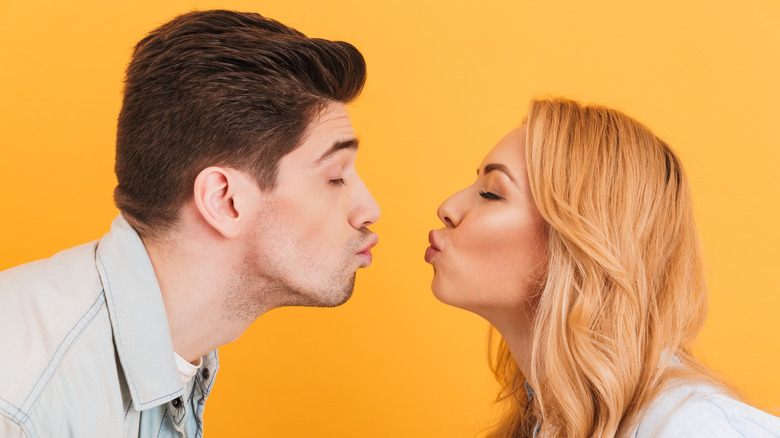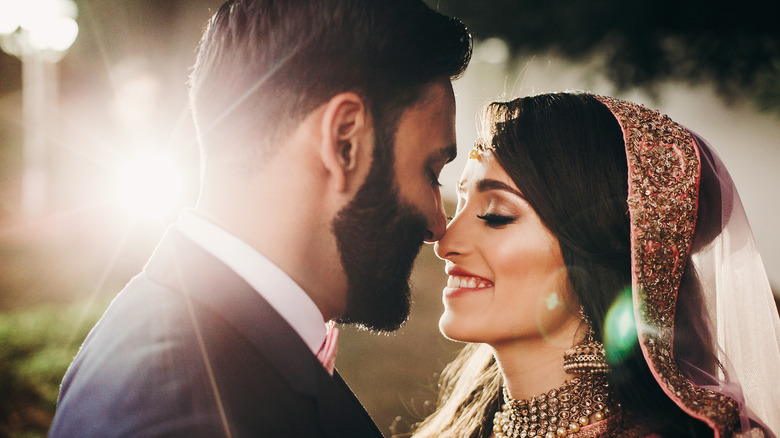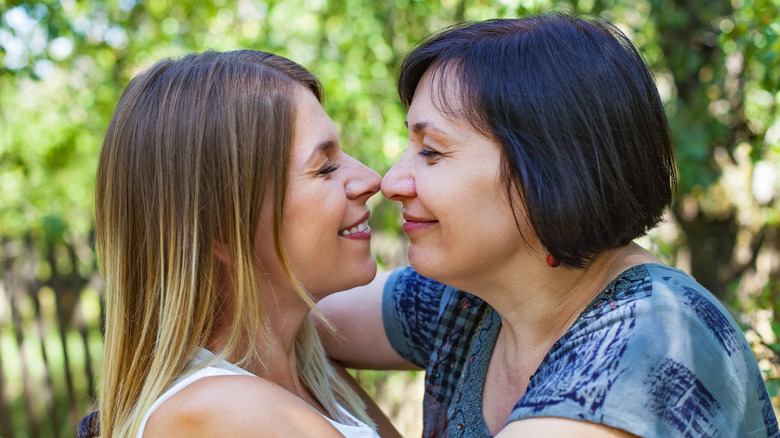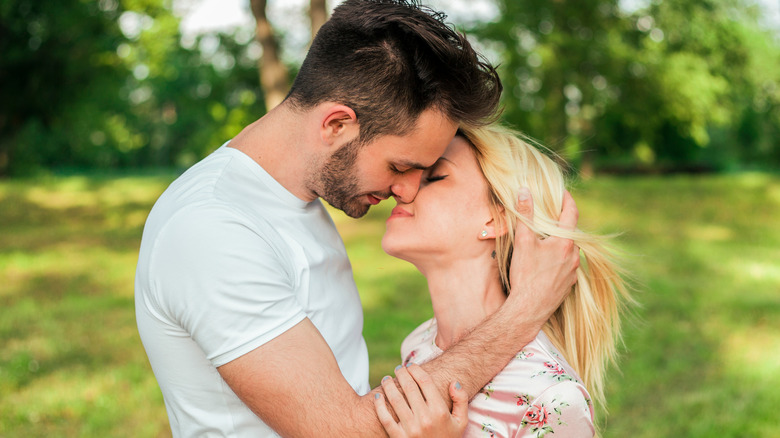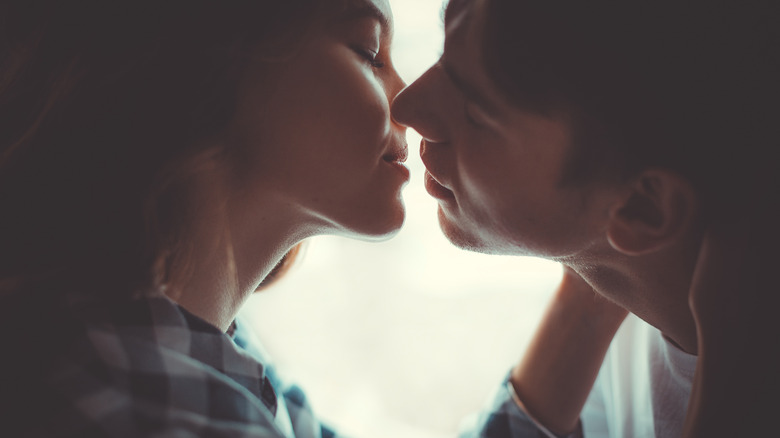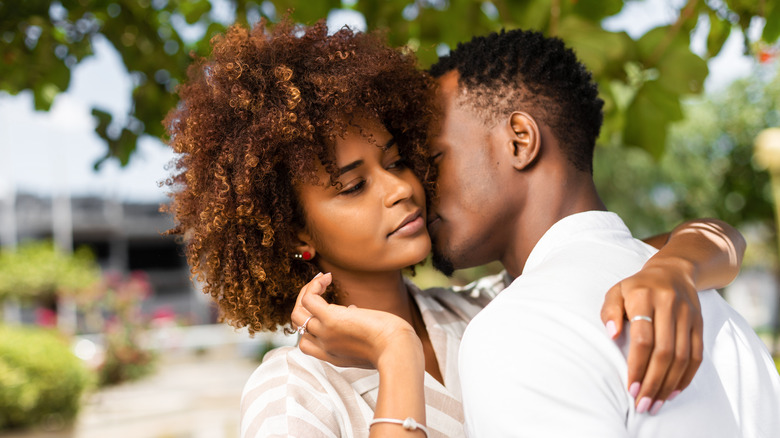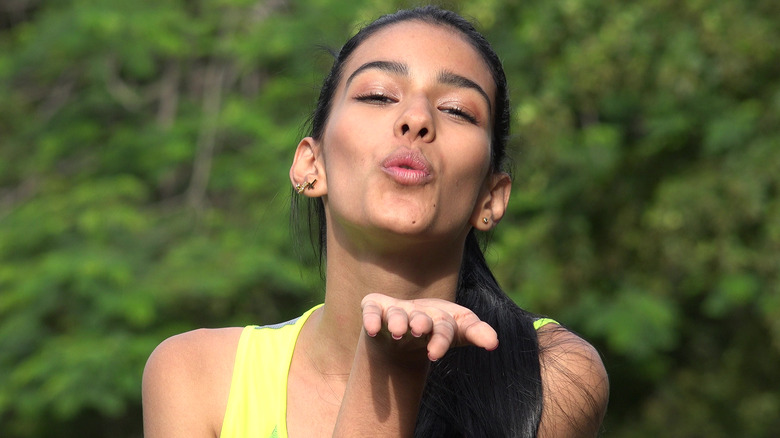Why Do We Kiss?
Think back to your very first kiss. That big day will always be cemented in your mind, but it's likely that all the hype surrounding the event was better than the smooch itself. It's possible that you were one of the lucky ones who experienced fireworks or, maybe, you engaged in an awkward, sloppy exchange of saliva that made you question why you were even excited to accomplish this milestone. Good times, good times.
Even if your first kiss was less than desirable, you wouldn't swear off kissing for good. Rather, you'd go on to experience more first kisses — some better, some worse — with other people. All the while, though, you likely never stopped to question why you — and people in general — even engage in this kissing business. Unlike cats that nuzzle and dogs that excitedly lick to show affection, why is it that humans have resorted to mouth-to-mouth contact? After all, we're one of the only species that engages in the behavior. Here's what's up.
The kiss-feeding theory
Kissing was long thought to be a "culturally evolved pattern of the western world," according to Comparing Behavior: Studying Man Studying Animals. But, in 1915, two researchers observed adult chimpanzees kiss-feeding one another. Kiss-feeding, or premastication as it is also called, is the act of chewing food and then passing it to the mouth of another. As odd as it may sound, this isn't just something animals do. Humans — mostly in other parts of the world — also kiss-feed their babies.
Apparently, premastication and smooching call for similar "movement patterns." Thus, it has been theorized that kissing could very well have stemmed from kiss-feeding. "In a wider context," Comparing Behavior reads, "this fits the more general rule that maternal behavior often becomes ritualized into patterns that are used to express affection or to create bonds." Can we all just take a minute to appreciate that we've dropped the "feeding" part of kiss-feeding? Phew.
The first kiss
Kissing — at least as we now know it — is pretty new, Rafael Wlodarski, a behavioral data scientist who studies philematology (the science of kissing) at the University of Oxford in England, confirmed to BBC Earth. However, researchers discovered proof that people were doing something like modern-day kissing some 3,500 years ago. According to the publication, Hindu Vedic Sanskrit texts described the form of kissing as "inhaling each other's soul." Intense.
Some 500 years later, a mouth-to-mouth behavior was also described in the Sanskrit epic Mahabharata. In fact, even the word "kiss" comes from India. Vaughn Bryant, an anthropologist who studies the science of kissing at Texas A&M University, explained to The Wall Street Journal that the root of the English word "kiss" is derived from the word "kus," which was used in India. The first kiss may very well have taken place in this southern Asian country.
Kiss as the Romans do
After kissing took off in India, researchers believe the practice began to spread across the globe thanks to Alexander the Great and his massive army. Since he conquered most of the world — well, what was known of the world at that time — the kiss was able to travel quite a distance.
Kissing is thought to have become especially widespread in Rome, Neel Burton, a psychiatrist and philosopher, explained in article for Psychology Today. "The Romans kissed their partners or lovers, family and friends, and rulers. They distinguished a kiss on the hand or cheek (osculum) from a kiss on the lips (basium) and a deep or passionate kiss (savolium)," he wrote. Rome also happens to be the birthplace of the wedding day kiss.
By the fall of Rome, however, kissing as a romantic gesture had all but died out. It wasn't until a thousand years later that kissing found its way back into romance. "The kiss of Romeo and Juliet is emblematic of this movement, which sought to remove courtship from the control of family and society and celebrate romantic love as a liberating, self-determining, and potentially subversive force," Burton explained. Kissing prevails.
Sniff-kisses
Not every kiss calls for mouth-to-mouth contact. The earlier forms of kissing, for example, were likely more about smelling than actually pressing lips. By the early 1900s, smelling as opposed to kissing as we know it was still commonplace in parts of India. Sniff-kisses still exist in modern day, too.
David Joanasi, information officer of Inuit Tapiriit Kanatami, a group that represents the Inuit, explained a type of kiss common in his culture: a kunik. While the kunik has been stereotyped as a form of rubbing noses, SouthCoast Today explained, "It's not so much rubbing noses as sniffing someone you love — their nose, cheeks, forehead — in a nuzzily show of affection." This loving behavior is common in familial and romantic relationships.
"When you're an infant and a little kid, your parents and grandparents and older siblings sniff you and rub your face with their nose," Joanasi explained. He also revealed that he and his girlfriend exchange kuniks. "But I wouldn't do it in front of a large audience," he clarified, "the same way you wouldn't French kiss your partner in front of a bunch of kindergartners."
A learned or instinctual behavior?
Despite all of the fascinating research that's been done about kissing, it's still not known whether kissing is a natural or learned behavior. The kiss-feeding theory points to signs that kissing is a learned behavior. Also, the fact that most animals don't kiss may signify that the behavior is learned. However, some animals do kiss and, even those that don't, display similar signs of affection. It's also true that not everyone has the innate desire to kiss.
As BBC Eatherth reported, the Mehinaku tribe in Brazil find the practice "gross." TBH, they're not exactly wrong. Since other modern-day groups of hunter-gatherers don't pucker up, it's difficult to see how kissing could be instinctual. Additionally, William Jankowiak, a professor at the University of Nevada in Las Vegas, published a study on kissing and found that kissing does not seem to be instinctual, but rather a Western behavior that has been passed on through generation after generation.
What's love got to do with it?
Kissing is often seen as a romantic gesture, but, believe it or not, kissing isn't much about romantic love at all. Scientists recognize that people who are attracted to each other are compelled to kiss and that people also experience a subconscious urge to, you know, do a bit more than kissing with said person. While mating and attraction are factors, romance, it seems, is not a main component, Rafael Wlodarski, a researcher at the University of Oxford in England, explained to Smithsonian Magazine.
Of course, there are also platonic forms of kissing — like a peck on the cheek — which, of course, don't have anything to do with romantic love, but also don't have the same mating urge or attraction factor attached. According to Wlodarski, these kisses may have initially stemmed from the same place as sexual kissing, but have since transformed into demonstrations of respect.
It's not even really about sex
Scientists have considered the idea that the whole point of kissing is to heighten sexual arousal prior to sex. In less scientific terms: foreplay. The things scientists study, amirite? A 2013 study published in Archives of Sexual Behavior, however, disproved the theory that kissing is, well, a means to an end.
As the study revealed, participants — especially women — considered kissing to be most important while in long-term relationships. In fact, participants who were in long-term relationships considered the frequency of kissing — not the frequency of sex — to be most indicative of relationship happiness. "You would think that intercourse would be even more bonding, more intimate, but that's not necessarily so," the study's lead author, Rafael Wlodarski, explained to The New York Times. "Maybe you have a happy relationship and you don't need more intercourse." He added that, for happy couples who are content in their relationship, kissing remained a "conveyor of emotion."
In the end, the study concluded with "very little evidence to support the hypothesis that the primary function of kissing is to elevate levels of arousal."
A way to suss out suitability
The 2013 study published in Archives of Sexual Behavior on the role of kissing in romantic relationships not only disproved that kissing is all about sex, it also revealed that kissing seems to play an important role in how heterosexual men and women assess potential mates.
A prior study published in Evolutionary Psychology in 2007 revealed that 59 percent of men and 66 percent of women found themselves no longer interested in a person after engaging in a kiss. A bad first kiss could make or break the relationship before it really even gets going, it appears. "I would hazard a guess that if someone thinks someone is a bad kisser it's because their smell wasn't right," lead author of the 2013 study, Rafael Wlodarski, explained to Smithsonian Magazine. He also speculated that women may be more likely to find themselves bowing out after a bad kiss because the stakes are higher. Smithsonian revealed, "Women have to be more selective because they face greater consequences when they make a poor mating decision — like having to carry a baby for nine months."
A rich sensory experience
"You can't have psychology without a biological brain," behavioral data scientist Rafael Wlodarski told Smithsonian Magazine. And, while it seems likely that there are multiple psychological and biological reasons for why we engage in kissing, we can't ignore the simple fact that kissing just feels good.
Neuroscientist Eric Haseltine explained to Psychology Today readers that "kissing causes a lot of brain tissue of [the kisser] to stimulate — and to be stimulated by — a correspondingly large amount of brain tissue of [the kissee]." He added, "When you throw in tongues, really impressive amounts of brain tissue from the two individuals are 'brought together.'" The brain digs kissing. Also, your mind views French kissing as "a very efficient way to provide a rich sensory experience." Cool, cool.
The neurologist further revealed that kissing also "maximizes the ability of one brain to exquisitely stimulate (via fine motor control) another brain." Yep, kissing provides people with the unique opportunity to literally stimulate another person's brain. With their tongue. Okay, we'll stop. This is sounding weird.
Testosterone-transferring
Although there's much more to kissing than sex, locking lips can play a remarkable role in foreplay. "There's evidence that saliva has testosterone in it, and there's also evidence that men like sloppier kisses with more open mouth," Helen Fisher, a biological anthropologist at Rutgers University, announced at a press conference (via Wired). "That suggests to me that they are unconsciously trying to transfer testosterone to trigger the sex drive in women."
Others agree. Researchers who took part in another study theorized that exchanging saliva during a kiss "may have biological consequences in its own right." The study authors added, "Male saliva contains measurable amounts of the sex hormone testosterone which can affect libido." And, as for slobbery kisses, history — as well as more recent studies — do provide basis for the belief that men are wetter kissers. "Many kisses, particularly in the Roman novels, are slobbery," Donald Lateiner of Ohio Wesleyan University in Delaware revealed (via Wired). It might not be all about passing testosterone, though.
Like women, men make assessments through kissing, but, according to Susan Hughes, an evolutionary psychologist at Albright College in Pennsylvania, "men have reduced chemosensory detection" so they "may need more saliva" to properly assess.
What's in a kiss?
Testosterone isn't the only thing that is exchanged during a smooch. "When two people kiss there is a rich and complicated exchange of information involving chemical, tactile, and postural cues," evolutionary psychologist Gordon G. Gallup, Jr. revealed in a University of Albany news release. "This may activate evolved mechanisms that function to discourage reproduction among individuals who are genetically incompatible."
Scientists have found that kissing can alter a person's levels of the feel-good hormone oxytocin and a 15-minute makeup session can even lower levels of the stress hormone cortisol. But more than just hormones are at play.
An article in the American Journal of Medicine revealed that an average kiss contains small amounts of water, protein, "organic compounds," fats, and sodium chloride. Yummy. Your standard kiss also contains anywhere from 10 million to 1 billion bacteria — and as many as 278 different species. Although most of these types of bacteria are not considered "bad," it's possible to pass herpes simplex, respiratory viruses, streptococci — the cause of strep throat — and, in very rare cases, gum disease. Mwah!
Attachment and bonding
Oxytocin may just be the key ingredient in a kiss — at least for men. This hormone has been found to aid men to bond with their partner and remain monogamous, which, biologically speaking, is "potentially costly for males," as one study put it.
Kissing is, of course, not just about swapping spit (and hormones and fats and proteins and... you get the point). It's about attachment and bonding — much like other forms of physical touch. "Romantic kissing may actually be one of the most effective bond-mediating courtship behaviors, with both males and females rating it as the type of physical affection 'most expressive of love,'" a 2013 study revealed. An earlier study also cited that couples had an easier time resolving their conflicts when engaging in displays of physical affection. Cuddling — or holding — and kissing on the lips were found to be the most effective forms of physical affection.
When kissing is important
Kissing is important while in long-term relationships, as highlighted above, but science has proved that kissing is important at other times, too. In fact, women rate kissing as more — or less — important depending on where they are in their menstrual cycle. As one study revealed, hormonal changes had previously been found to have an effect on women's mate preferences. It was discovered that women who were in the follicular phase — the phase in which a woman has the highest chances of getting pregnant — preferred men "displaying putative signals of underlying genetic fitness." Because researchers recognized that there was also a link between kissing and choosing a mate, they decided to test the theory that kissing would be of more or less importance depending on where a woman was in her cycle.
Sure, it's a strange study, but the results were interesting. "Using an international online questionnaire," the study explained, "results showed that women in the follicular phase of their menstrual cycle felt that kissing was more important at initial stages of a relationship than women in the luteal phase of their cycle." As it happens, this is the most difficult phase in which to conceive.
Making out is not universal
The more you learn about kissing, the more you may agree with the hunter-gatherer tribe in Brazil. However, it's not only people in remote tribes who find the practice disgusting. It was once believed that 90 percent of the global population engaged in a form of romantic kissing. But that figure was way off.
In 2015, researchers studied 168 different cultures around the world and discovered that under half — 46 percent — of them swapped kisses. And, if you're thinking this isn't the case in western cultures, think again. The study (via Women's Health) revealed that an astounding 45 percent of North American cultures surveyed don't participate in romantic-sexual kissing.
One form of kissing was found to be prevalent in all cultures, though. "It does seem to be a human universal that adults kiss babies or small children," the study's lead author William Jankowiak told NPR. But the thought of kissing a romantic partner? Ew. According to Jankowiak, one researcher revealed to him that some of those he interviewed admitted to "[nibbling] each other's eyebrows," but nevertheless found the idea of kissing to be gross. Nothing says "I love you" quite like eyebrow-nibbling, right?
